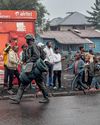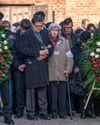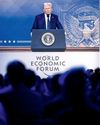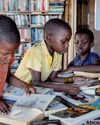
In early March 2022, when his country seemed in danger of falling to the Russians, it occurred to Leonid Marushchak, a historian by training, to call the director of a museum in eastern Ukraine to check that a collection of 20th-century studio pottery was safe.
He had loved the modernist works by artist Natalya Maksymchenko since he had encountered them almost a decade earlier. There were vessels covered with bold abstract glazes in purple, scarlet and yellow; exuberant figurines of musicians and dancers with swirling skirts; dishes painted with birds in flight. The collection was the radiant highlight of the local history museum in Sloviansk, the ceramicist's home town.
It was remarkable that they were in this small museum at all. Though she was born in Ukraine in 1914 and studied in Kharkiv, Maksymchenko had lived the rest of her life in Russia. But, after her death in 1978, her family, fulfilling her wishes, oversaw the transfer of about 400 works from her studio in Moscow to the city of her birth. It was a deeply resonant act. When the historic traffic of artworks has so often been from Ukraine to Russia, when artists' national allegiances have been subsumed by the Soviet Union, when works in international museums by Ukrainians (such as Kyiv-born Kazimir Malevich) have been routinely labelled "Russian", Maksymchenko's final gift to her home town and country seemed like a statement of defiance.
Now, as the Russian army inched nearer and nearer to the museum, Marushchak worried that these works in delicate porcelain could be destroyed by a missile in a moment - or, if Sloviansk were occupied, taken by the invaders back to Moscow. Had the ceramics been prioritised for the first round of evacuations, Marushchak asked the museum director on the phone.
"Lyonya, what round?" came the reply. "We still haven't got the order to evacuate!"
This story is from the August 09, 2024 edition of The Guardian Weekly.
Start your 7-day Magzter GOLD free trial to access thousands of curated premium stories, and 9,000+ magazines and newspapers.
Already a subscriber ? Sign In
This story is from the August 09, 2024 edition of The Guardian Weekly.
Start your 7-day Magzter GOLD free trial to access thousands of curated premium stories, and 9,000+ magazines and newspapers.
Already a subscriber? Sign In

What is DEI and why is Trump waging war against it?
When American voters headed to the ballot box in November, opinion polls suggested the cost of living, immigration and reproductive rights ranked among their biggest concerns.

Who are M23 rebels and why is there fighting in eastern DRC?
The armed group M23 and Rwandan soldiers entered the centre of Goma last Sunday after weeks of advancing on the main city in the Democratic Republic of the Congo's North Kivu province.

Aid distribution What Israel's ban on Unrwa may mean for Palestinians
Israel this week insisted it would not back down over its plan to close the Gaza operations of the United Nations Relief and Works Agency for Palestine Refugees (Unrwa), even though critics said the move would jeopardise urgent humanitarian aid efforts.

Anti-terror strategy failed to stop a killer
Southport attacker's lack of coherent ideology meant the Prevent scheme did not see him as a potential risk, exposing the need for reform
Last writes
Handwriting is disappearing - we are far more likely to use our hands to type or swipe than pick up a pen. But in the process are we in danger of losing cognitive skills, sensory experience and a connection to history?

I just want to hug those girls' Bittersweet joy and relief as freed soldiers return home
Nineteen-year-old Naama Levy became an indelible symbol of Hamas’s 7 October 2023 attack on Israel.

Eighty years after the liberation of Auschwitz, survivors call for courage amid the rise of hatred and antisemitism 'We must avoid the mistakes of the 1930s'
On a day of startling blue skies, Auschwitz survivors stood before princes and presidents on Monday to remind the world, perhaps for the final time, of the horrors they suffered there during one of the darkest moments of human history.

Davos lessons Trump's return heralds new era of harsh global competition
In the heady mountain air of Davos last week, away from the parties and the backslapping tech bros, another, more beleaguered crew touted their wares: the multilateralists.

Can the continent's publishing industry turn a page?
Tsitsi Dangarembga's Nervous Conditions, a novel about growing up in colonial Zimbabwe, is one of the most important works of 20th-century African literature and features on university curriculums across the UK.

Trump has arrived with abang-but can he follow through?
Little more than a week ago, Stewart Rhodes was serving an 18-year prison sentence for seditious conspiracy over his role in a deadly attack on the US Capitol.